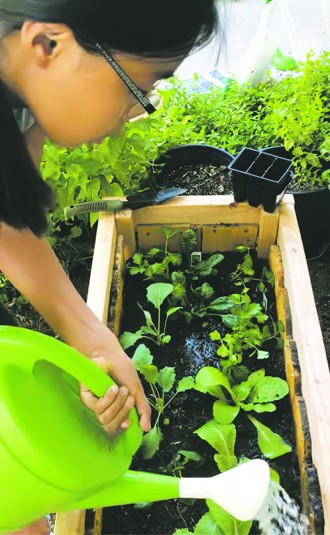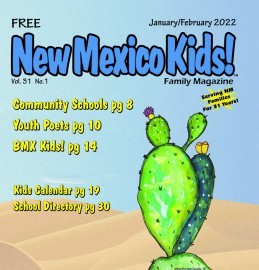Native Youth Help Boost Agricultural Traditions With Garden Boxes, Seed Libraries
Gardening Kids!
Native Youth Help Boost Agricultural Traditions With Garden Boxes, Seed Libraries
June 8, 2022By EFRAIN VILLA

Digesting complex social issues and being socially engaged citizens can be difficult for adults, let alone children. But nurturing a strong sense of altruism early on in kids’ lives can put them on a path marked by purpose. In our culturally rich state, it is also important for history and tradition to be integrated into efforts involving youth leadership development.
For more than two decades, the Coalition to Stop Violence Against Native Women (CSVANW), a New Mexico nonprofit, has been focused on indigenous rights, including supporting Native advocates working to prevent domestic violence, sexual assault, dating violence, stalking and sex trafficking in New Mexico’s tribal communities. When launching initiatives and programming involving children, CSVANW does so with “recognition that Indigenous youth are leaders of today and stand on the frontlines within our communities with the love they have for the people and their land,” according to the group’s website.
In that spirit, CSVANW launched a multifaceted community gardening program last spring through a grant from the First Nations Development Institute. The objective was to help equip indigenous people in New Mexico with the materials and know-how to grow food for themselves while honoring their agricultural traditions.
Although the connection between being able to grow one’s own food and antiviolence initiatives may not be immediately obvious to people unfamiliar with colonial history, Jovita Belgarde, Native youth program coordinator at CSVANW, says the historical and present links are straightforward.
“Food sovereignty is a big part of violence prevention because hunger is a result of systemic violence,” says Belgarde. “Many of our indigenous ways of being with the land were taken from us. When you teach young people how to plant today, that’s a revolutionary act of reclaiming culture, reclaiming identity and reclaiming our food systems. It’s a beautiful thing. Also, when people have their basic needs met, like access to food, they are better able to handle difficult situations.”
Other benefits of growing one’s own food at home include knowing the origins of one’s meals, access to nutritious produce without harmful additives and pesticides, and mental health boosts from outdoor exercise. In indigenous communities, rekindling a rich history of agricultural traditions and alleviating the effects of limited access to healthy food options can also be important achievements.
“Often Native communities are in food deserts, which means they don’t have grocery stores that have healthy, affordable food,” says Belgarde. “When you teach people how to grow food, you’re also teaching them the skill of how to take their health back into their own hands. That can have a lot of health benefits for the whole family and community.”
The first step in developing the community gardening program was to create a seed library housing various seeds that are naturally acclimatized to New Mexico’s growing conditions. All seeds for the library were donated, and Aaron Lowden, a farmer from Acoma Pueblo, provided technical expertise.
The next step was to engage indigenous people throughout New Mexico to grow the seeds in their gardens and farms. For this, CSVANW created garden box giveaway events in the Navajo Nation, Acoma Pueblo, Nambe Pueblo and Albuquerque. Because the pandemic complicated the logistics of gatherings, organizations in each community helped with distribution efforts, scheduling and public awareness campaigns.
To design the boxes, CSVANW borrowed a template from Food is Free Albuquerque, a nonprofit that works for social empowerment through growing and sharing fresh food. The organization also helped with material donations and garden box giveaway events.
To build the garden boxes, CSVANW staff trained at the FUSE Makerspace in downtown Albuquerque, which donated their space, machinery and educational services. FUSE Makerspace is a community center, which has a partnership with Central New Mexico Community College to provide the tools and know-how to help members manufacture items. At the workshop, the wooden garden boxes, which double as shipping vessels and growing containers, were fully assembled and readied to be filled with garden growing goodies.
Soil was donated by the Albuquerque nonprofit Soilutions, which partners with local businesses to turn green waste into organic compost. In addition to soil and seeds, the garden boxes also contained live plants as well as educational literature from the Native Farm-to-School Resource Guide on growing and saving seeds.
The original plan was to distribute 50 garden boxes at four events, but in the end, about 100 boxes were built and distributed. Some communities also gave away ollas, clay pots that help people in dry regions efficiently use slow drip irrigation.
The pandemic complicated volunteer recruitment, but several youth volunteers were able to participate. Seven-year-old Kai Smith brought her gardening experience to the project. “I was the one who would gather up the plants and I’d give them to, like, the window or put them in the back,” says Smith.
Ten-year-old Lily Sandoval also took part. “I think it’s really cool what they are doing for people,” says Sandoval. “It makes them feel better about themselves and their background and history. My favorite part, personally, is watching them (plants) grow.”
The seed library that resulted from the initiative is a community resource that CSVANW hopes will continue to serve indigenous home gardeners and farmers throughout the state for years.
There are opportunities for youth to get involved with CSVANW year-round. The organization is seeking 13- to 17-year-old indigenous youth interested in building leadership skills to join their Native Youth Council. For more information: csvanw.org

